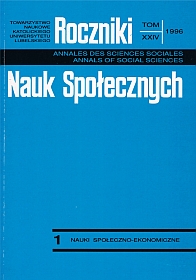Czy możliwy jest „liberalizm katolicki”?
Abstrakt
In the beginning the author writes about some kind of "colour blindness" when it comes to the interpretation of the Catholic social doctrine on the part of the authors of Marxist and liberal orientation. When the Catholic social doctrine speaks about private property and freedom human rights then it is thrust into a "white sack"; however, when it speaks about social justice and social human rights, then it is thrust into a "black bag". This is done, for instance, by Michael Novak in his book Liberalizm − sprzymierzeniec czy wróg Kościoła, published also in the Polish language. In turn, the author lists some criteria how to interpret the social doctrine of the Church, and he gives two characteristics of that doctrine: invariability (fixed principles) and progressiveness. He establishes the basic presuppositions of liberalism − freedom taken negatively (the postulate to separate the Church from the State is not a presupposition, for in the cradle of liberalism − that is in Britain − it has not been regarded as such up to date), and the principal feature of capitalism − the priority of capital over labour. The author holds that "Catholic liberalism" is not possible, for the social doctrine of the Church is based on an entirely different theological and philosophical anthropology from that of liberalism or socialism. Most attention has been given to Novak's book, mentioned before, and he makes a critical analysis of it. One may notice many positive elements in Novak's opinions, but still more of them are negative. The positive elements are the following: he proves that we cannot understand liberalism without the Judeo-Christian tradition; the free market may function when the law is respected; sound economy may not persist for long in the atmosphere of moral decadence; the rights of human dignity must be acknowledged, if democracy is not to subside under its own weakness. The strength of a chain, however, is not in its strong links. Now there are many links in Novak's book. Firstly, he interprets the social doctrine of the Church in the spirit of either liberalism or Anglo-Protestant theology. Secondly, a special "method of selection" is used with this interpretation. Thirdly, he fails to notice the progressive character of the social doctrine of the Church, opposing the teaching of one pope to that of another pope, and falsifies this teaching. Fourthly, he ascribes the countries of Catholic tradition with a penchant for and susceptibility to give in to totalitarian regimes, and (former) Catholics, according to him, revel in acts of terror. In this context the author puts forward a question, were K. Marx, A. Hitler, W. Lenin and J. Stalin Catholics? And the greatest dictatorships, which appeared in the twentieth century, did they take place in the Catholic countries? Bp P. Jarecki, a disciple of prof. Schaschinga, while evaluating Novak's book writes that it is "an example of how not to pursue the Catholic social doctrine." The book contains, as Bp Jarecki states, an irresponsible criticism of the social thought of popes, there is no clarity nor logical thinking, and it is imbued with manipulation. It is true that Novak renders the social teaching of the Church in a broad manner, but is imprecise, nonobjective and often contradictory. He dedicates his book "to all those who appreciate Catholic social thought and wish to develop it further." In some other place he writes, "I do not think that Catholic social thought should serve a liberal society, quite the contrary." He also claims that "Catholic social thought, having waited very long, based itself on the fundamental principle of the dignity of the human person" and approved of liberal institutions: private property, human rights and democracy. Novak states that John Paul II accepted capitalism. In the final part of his paper the author proves that the principle of the dignity of the human person was well-known and developed in the patristic, medieval and Renaissance thought; St. Thomas used the term "dignity as many as 1760 times." The patristic and medieval thought accepted also private property. The elements of human rights, as we understand them today, are included in the Decalogue, and religious freedom in the Gospels. We find human rights in Magna Carta (1215), which was inspired by Catholic social thought. Paweł Włodkowic, a participant of the Council in Constance (15th c.) developed the idea of human rights, then it was developed by Francis de Vitoria and others. It is true that people got particularly interested in human rights in the period of the Enlightenment, but it was the Enlightenment that discovered human rights. The Athenians knew the idea of democracy. Most recent research proves that the constitutions of democratic states were inspired by the Cistercian constitutions (J. Moulin). Democracy should not be identified with a Republican regime, for it occurs also in constitutional monarchies. Novak's book, though it the imprimatur of the Dominican Provincial in the Polish edition, should be judged negatively − writes the author.
Copyright (c) 1996 Roczniki Nauk Społecznych

Utwór dostępny jest na licencji Creative Commons Uznanie autorstwa – Użycie niekomercyjne – Bez utworów zależnych 4.0 Międzynarodowe.


